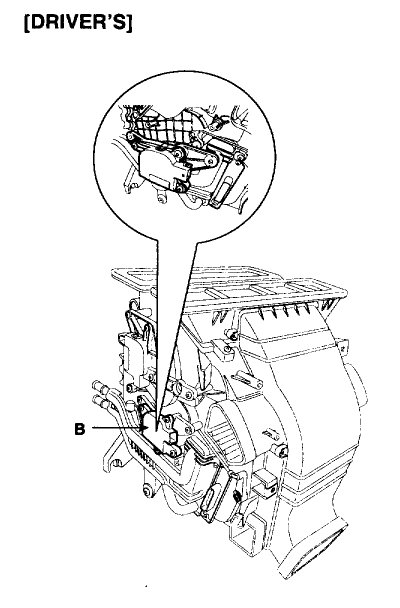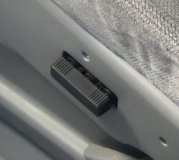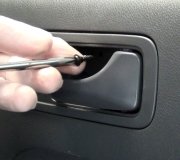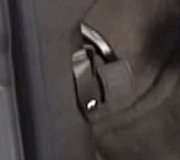Being "bumped" is a common excuse. In fact, that is a big issue with Ford in-dash six-disc changers, but other units are designed to withstand driving over really bumpy roads. I know you wont want to hear this, but there actually are a few ways the player could have failed that are not the mechanic's fault.
The first problem has to do with disconnecting the battery. There is a good chance that needed to be done before working on computer-controlled systems under the dash. Everything that uses a microprocessor has an internal "reset" circuit. Microprocessors have millions of transistors. When power is applied to them, as in reconnecting the car's battery, those transistors turn on or off in some random state. The reset circuit operates one time for a very tiny fraction of a second to set all of those transistors into their starting point, then the microprocessor starts operating. There have been some models that have all developed a problem with that reset circuit. The thing is, that circuit is done doing its thing right after power was restored, then the reset circuit can fail weeks or months later, but you will never know it, until the battery is run dead or disconnected. When the battery is reconnected, the reset circuit does not work, so the microprocessor is confused and does weird things or nothing at all. A lot of mechanics and people at battery stores get falsely blamed for causing the problem when it actually had nothing to do with their procedures. At battery stores where they offer to install the new battery, they use "memory saver" devices now to prevent these problems from showing up. If you buy a new battery and take it home to install it yourself, like we did for decades without a problem, who would you blame then if this problem showed up?
You can compare this failure to a failed starter. It is unlikely a starter is going to fail at exactly the instant you turn the ignition switch. It more likely failed ten minutes or an hour before you stopped the engine, but how would you know? Once the engine is running, the starter isn't needed or used. The only way to know the starter has failed is to stop the engine, then find it won't crank when you want to restart it. You wouldn't blame the starter failure on the gas station, restaurant, or store you stopped to shop at. But if something failed while the mechanic had the car, that's a different story. It is automatically his fault, even though we do not know how he managed to cause it. In this case I cannot even imagine how I could intentionally cause this if I wanted to, . Except for those miserable Ford changers. (They have a sticker on them that says, "scrap if dropped". Do not even waste your time trying to repair them)
The second thing to consider is once power is restored, or you insert a new CD, the mechanism has to read the table of contents, "TOC" at the center of the disc. Until it does that, it does not know where to place the laser to find the tracks. Three things can cause a failure to read the TOC. One is simply a dirty laser lens. You can try a cleaning CD, but usually the lens needs to be cleaned with a cotton swab. On Chrysler CD / cassette combo radios that means just popping off the top cover. On most other models it is more involved and requires a lot of disassembly.
A weak laser can also cause the system to fail to initialize because it can't read the TOC. GM had a 100 percent failure of their laser assemblies throughout the 1990's. It was so common, it didn't pay to go looking for other causes. I haven't heard of that being real common on any other brands, but here and there you will always find a few failures.
The laser "sled" rides back and forth on metal guide rails that are lubricated with a light grease. Often dust settles on that grease or it just becomes hardened over time from drying out. That grease can block the laser sled from moving far enough to find the TOC. Related to that, when you burn your own music CD's on a laptop or home computer, those write the TOC in a slightly different location than on store-bought CD's. A lot of auto CD players can't reach far enough to find the TOC, so they won't play. The clinker is that CD will play fine in another car, and it might even work in your car once in a while. If a burned CD plays okay, you eject it, immediately reinsert it and it wont play, that is the problem. Some car CD players will simply not play a burned CD, period. There is no anti-piracy conspiracy theory at play. It simply has to do with the design and tolerance of the mechanisms. On a lot of cheaper CD mechanisms, they run the laser sled on plastic slides instead of chrome-plated rails. Dust and dried grease will cause problems on those plastic assemblies a lot sooner than on the metal rails.
The last thing to look at, if you have a multi-disc in-dash CD changer, is those pull in one disc to play from a slot that gets put in memory. When the battery is disconnected, then reconnected, the mechanism tries to initialize by moving a loaded disc into a slot, then it checks which slots have discs in them. It may try to slide the disc into a slot that already has one in it. What you need to do is eject all the discs, then try to eject them all again even though you know the slots are empty. This occurs more commonly to changers that use a removable cartridge. I have a twenty three year-old car that has spent ninety nine percent of its life in storage. I installed a six-disc changer when the car was new. The first time I reinstalled the battery, after the car was sitting all winter, the unit tried to initialize, then set an error fault code. The fix was to eject the cartridge and the five discs that came out, then reinsert the cartridge empty. After it initialized, which took about forty five seconds, the last disc was always found to show up in slot number two. The problem was caused by disconnecting the battery so the microprocessor lost its memory and did not know which slot the disc had come from. Now I just make sure to eject the cartridge before I remove the battery.
Small Claims Court is the last thing I want to hear, regardless of which side you are on. First of all, I find it very hard to believe anyone would intentionally try to damage something that would so obviously be blamed on them. If an unscrupulous person wanted to do something like that, they would do something that you wouldn't notice for days or weeks, or would not be attributed to their service. Second, being a product of the TV / VCR repair field since the 1970's, I know how often things like this happen. We call it "being married to the product". That means that whatever goes wrong with it from now until forever, it is our fault because we touched it. I have actually been accused of breaking the picture tube in a TV that I had worked on over six years earlier! (In case you aren't aware, breaking a picture tube on purpose to dispose of it is an extremely dangerous procedure, and there is absolutely no way a picture tube can be "slightly" broken and still work).
What I would do is try any of the previous cures I mentioned first that apply. Beyond that, the player would have to be autopsied to see what is wrong before we can lay blame. As I mentioned with those radios with the failed reset circuit, that covered two CD-radio models and two cassette-radio models. Eventually one hundred percent of them failed. Some failed in the first year and some didn't fail until they were over ten years old. Regardless of how old they were, in every single case, once the reset circuit failed, the radio worked perfectly fine for months or years until the battery was disconnected. Then that radio failure was always blamed on the person who disconnected the battery. This is a perfect example of why so many people think mechanics are out to get them.
As a side note, I have never heard of a dealer sending a customer with an original equipment CD player to an audio store. Understand that according to some national trainers, Hyundai, Toyota, and Chrysler are at the top of the list, in that order, for having customer-friendly business practices, so it is possible an independent repair shop can buy a radio service manual for your car. GM, along with a few European manufacturers are way down at the bottom of that list. One of GM's customer-unfriendly business practices is to no longer allow us to buy service manuals for their radios. They have all that lucrative business locked up for their two authorized service centers, and as such, there is absolutely no way you will get a radio repaired, shipped back, programmed, and reinstalled for anywhere close to $350.00. It is more common to get a $450.00 bill for a radio / cassette player. I used to charge dealers around my state as much as $55.00 for repairs like this.
Wednesday, October 26th, 2016 AT 9:23 PM



